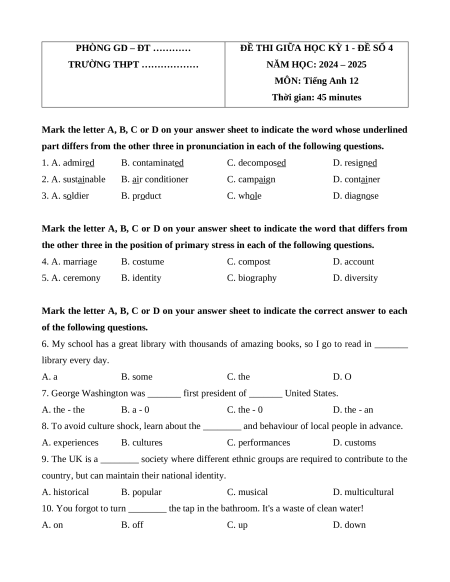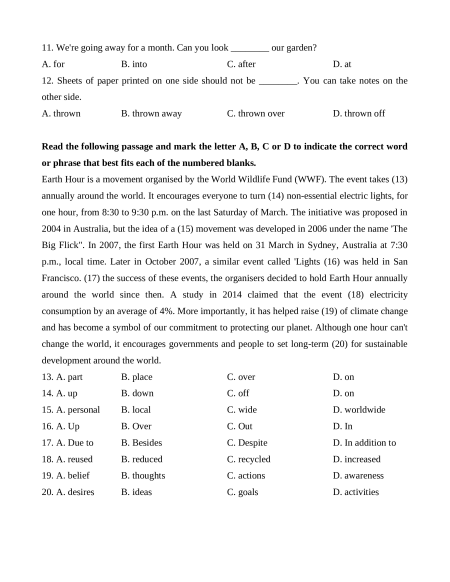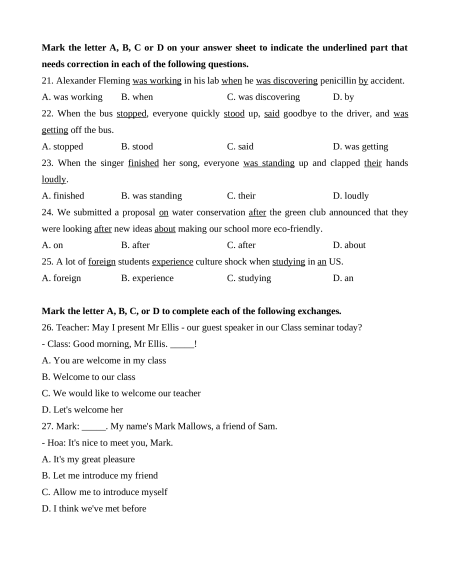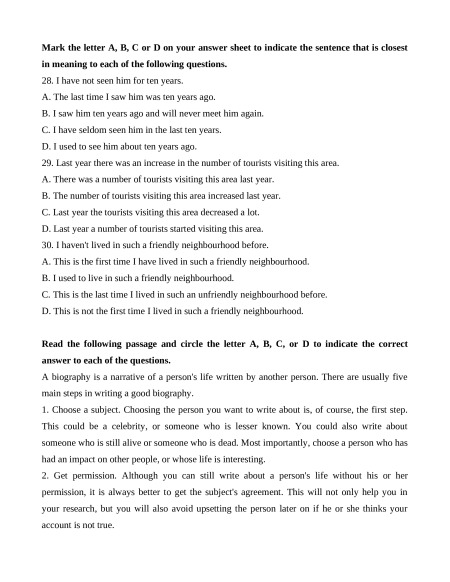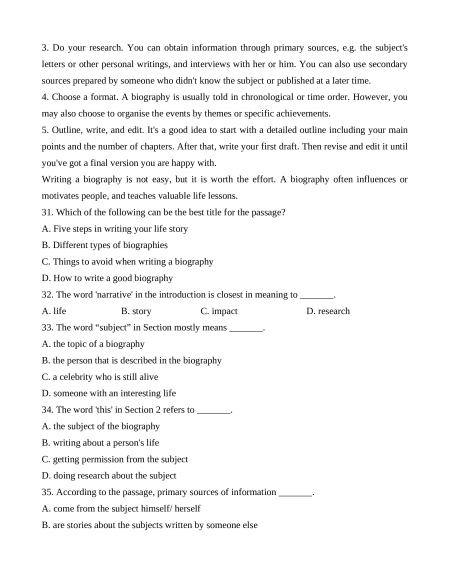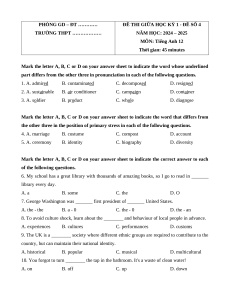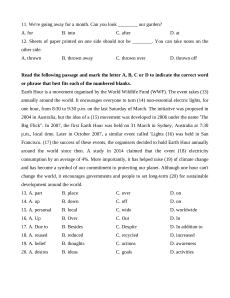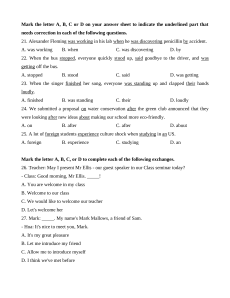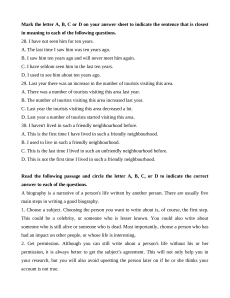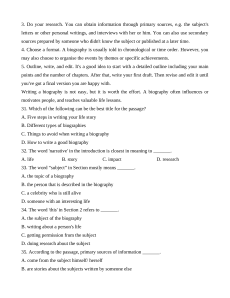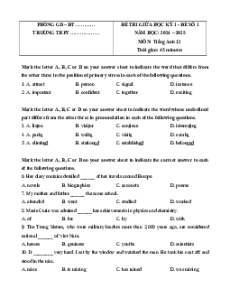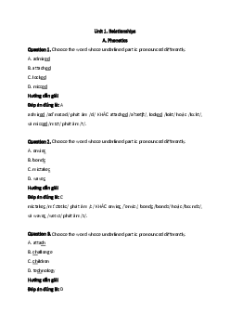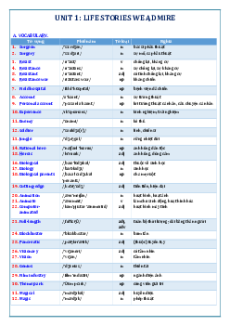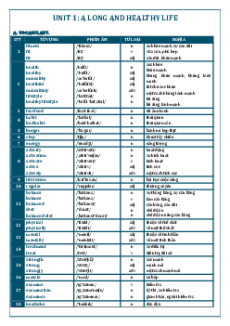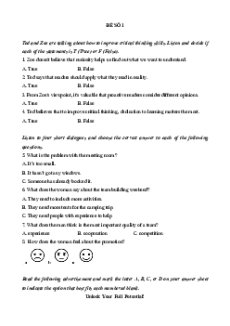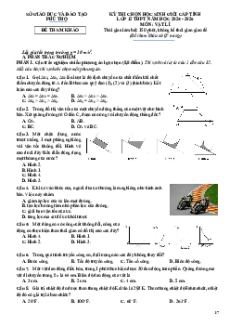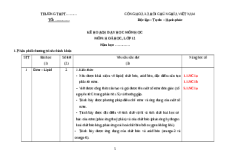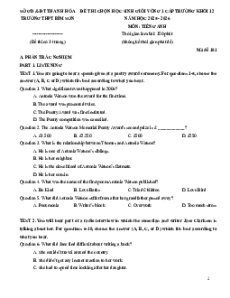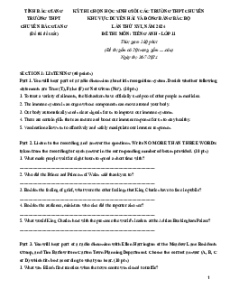PHÒNG GD – ĐT …………
ĐỀ THI GIỮA HỌC KỲ 1 - ĐỀ SỐ 4
TRƯỜNG THPT ………………
NĂM HỌC: 2024 – 2025 MÔN: Tiếng Anh 12 Thời gian: 45 minutes
Mark the letter A, B, C or D on your answer sheet to indicate the word whose underlined
part differs from the other three in pronunciation in each of the following questions. 1. A. admired B. contaminated C. decomposed D. resigned 2. A. sustainable B. air conditioner C. campaign D. container 3. A. soldier B. product C. whole D. diagnose
Mark the letter A, B, C or D on your answer sheet to indicate the word that differs from
the other three in the position of primary stress in each of the following questions. 4. A. marriage B. costume C. compost D. account 5. A. ceremony B. identity C. biography D. diversity
Mark the letter A, B, C or D on your answer sheet to indicate the correct answer to each
of the following questions.
6. My school has a great library with thousands of amazing books, so I go to read in _______ library every day. A. a B. some C. the D. O
7. George Washington was _______ first president of _______ United States. A. the - the B. a - 0 C. the - 0 D. the - an
8. To avoid culture shock, learn about the ________ and behaviour of local people in advance. A. experiences B. cultures C. performances D. customs
9. The UK is a ________ society where different ethnic groups are required to contribute to the
country, but can maintain their national identity. A. historical B. popular C. musical D. multicultural
10. You forgot to turn ________ the tap in the bathroom. It's a waste of clean water! A. on B. off C. up D. down
11. We're going away for a month. Can you look ________ our garden? A. for B. into C. after D. at
12. Sheets of paper printed on one side should not be ________. You can take notes on the other side. A. thrown B. thrown away C. thrown over D. thrown off
Read the following passage and mark the letter A, B, C or D to indicate the correct word
or phrase that best fits each of the numbered blanks.
Earth Hour is a movement organised by the World Wildlife Fund (WWF). The event takes (13)
annually around the world. It encourages everyone to turn (14) non-essential electric lights, for
one hour, from 8:30 to 9:30 p.m. on the last Saturday of March. The initiative was proposed in
2004 in Australia, but the idea of a (15) movement was developed in 2006 under the name 'The
Big Flick". In 2007, the first Earth Hour was held on 31 March in Sydney, Australia at 7:30
p.m., local time. Later in October 2007, a similar event called 'Lights (16) was held in San
Francisco. (17) the success of these events, the organisers decided to hold Earth Hour annually
around the world since then. A study in 2014 claimed that the event (18) electricity
consumption by an average of 4%. More importantly, it has helped raise (19) of climate change
and has become a symbol of our commitment to protecting our planet. Although one hour can't
change the world, it encourages governments and people to set long-term (20) for sustainable development around the world. 13. A. part B. place C. over D. on 14. A. up B. down C. off D. on 15. A. personal B. local C. wide D. worldwide 16. A. Up B. Over C. Out D. In 17. A. Due to B. Besides C. Despite D. In addition to 18. A. reused B. reduced C. recycled D. increased 19. A. belief B. thoughts C. actions D. awareness 20. A. desires B. ideas C. goals D. activities
Mark the letter A, B, C or D on your answer sheet to indicate the underlined part that
needs correction in each of the following questions.
21. Alexander Fleming was working in his lab when he was discovering penicillin by accident. A. was working B. when C. was discovering D. by
22. When the bus stopped, everyone quickly stood up, said goodbye to the driver, and was getting off the bus. A. stopped B. stood C. said D. was getting
23. When the singer finished her song, everyone was standing up and clapped their hands loudly. A. finished B. was standing C. their D. loudly
24. We submitted a proposal on water conservation after the green club announced that they
were looking after new ideas about making our school more eco-friendly. A. on B. after C. after D. about
25. A lot of foreign students experience culture shock when studying in an US. A. foreign B. experience C. studying D. an
Mark the letter A, B, C, or D to complete each of the following exchanges.
26. Teacher: May I present Mr Ellis - our guest speaker in our Class seminar today?
- Class: Good morning, Mr Ellis. _____! A. You are welcome in my class B. Welcome to our class
C. We would like to welcome our teacher D. Let's welcome her
27. Mark: _____. My name's Mark Mallows, a friend of Sam.
- Hoa: It's nice to meet you, Mark. A. It's my great pleasure B. Let me introduce my friend
C. Allow me to introduce myself D. I think we've met before
Mark the letter A, B, C or D on your answer sheet to indicate the sentence that is closest
in meaning to each of the following questions.
28. I have not seen him for ten years.
A. The last time I saw him was ten years ago.
B. I saw him ten years ago and will never meet him again.
C. I have seldom seen him in the last ten years.
D. I used to see him about ten years ago.
29. Last year there was an increase in the number of tourists visiting this area.
A. There was a number of tourists visiting this area last year.
B. The number of tourists visiting this area increased last year.
C. Last year the tourists visiting this area decreased a lot.
D. Last year a number of tourists started visiting this area.
30. I haven't lived in such a friendly neighbourhood before.
A. This is the first time I have lived in such a friendly neighbourhood.
B. I used to live in such a friendly neighbourhood.
C. This is the last time I lived in such an unfriendly neighbourhood before.
D. This is not the first time I lived in such a friendly neighbourhood.
Read the following passage and circle the letter A, B, C, or D to indicate the correct
answer to each of the questions.
A biography is a narrative of a person's life written by another person. There are usually five
main steps in writing a good biography.
1. Choose a subject. Choosing the person you want to write about is, of course, the first step.
This could be a celebrity, or someone who is lesser known. You could also write about
someone who is still alive or someone who is dead. Most importantly, choose a person who has
had an impact on other people, or whose life is interesting.
2. Get permission. Although you can still write about a person's life without his or her
permission, it is always better to get the subject's agreement. This will not only help you in
your research, but you will also avoid upsetting the person later on if he or she thinks your account is not true.
Đề thi giữa kì 1 Tiếng Anh 12 Global success (Đề 4)
533
267 lượt tải
MUA NGAY ĐỂ XEM TOÀN BỘ TÀI LIỆU
CÁCH MUA:
- B1: Gửi phí vào TK:
1133836868- CT TNHH DAU TU VA DV GD VIETJACK - Ngân hàng MB (QR) - B2: Nhắn tin tới Zalo VietJack Official ( nhấn vào đây ) để xác nhận thanh toán và tải tài liệu - giáo án
Liên hệ ngay Hotline hỗ trợ: 084 283 45 85
Chúng tôi đảm bảo đủ số lượng đề đã cam kết hoặc có thể nhiều hơn, tất cả có BẢN WORD, LỜI GIẢI CHI TIẾT và tải về dễ dàng.
Để tải tài liệu gốc về máy bạn click vào nút Tải Xuống ở trên!
Thuộc bộ (mua theo bộ để tiết kiệm hơn):
- Tailieugiaovien.com.vn giới thiệu bộ đề thi giữa kì 1 môn Tiếng anh 12 Global success mới nhất năm 2024 nhằm giúp Giáo viên có thêm tài liệu tham khảo ra đề thi Tiếng anh lớp 12.
- File word có lời giải chi tiết 100%.
- Mua trọn bộ sẽ tiết kiệm hơn tải lẻ 50%.
Đánh giá
4.6 / 5(533 )5
4
3
2
1
Trọng Bình
Tài liệu hay
Giúp ích cho tôi rất nhiều
Duy Trần
Tài liệu chuẩn
Rất thích tài liệu bên VJ soạn (bám sát chương trình dạy)
